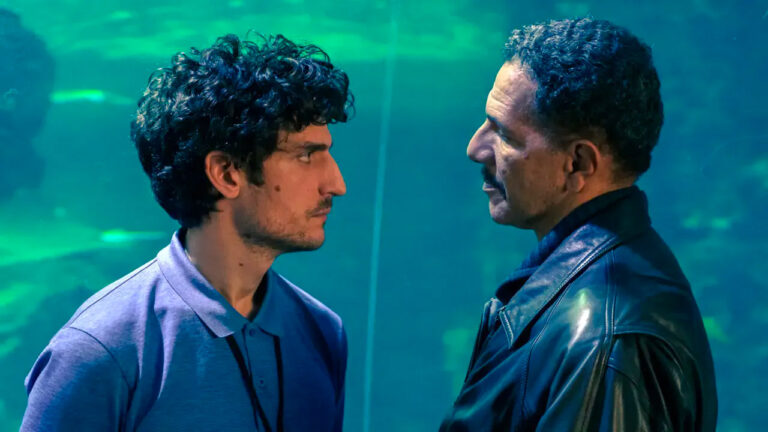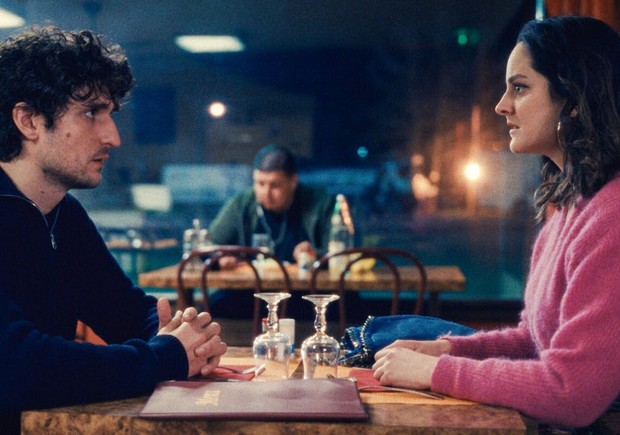
After Two Friends (2015), A Faithful Man (2018) and The Crusade (2021), Louis Garrel returns behind the camera with The Innocent (L’Innocent), presented at the 75th Cannes Film Festival. This feature was recently part of the 28th edition of Rendez-Vous with French Cinema in New York City.
Garrel throughout L’Innocent reminds his spectators how cinema is the art of deception, and we are catapulted in this filmic trompe-l’œil-trompe l’esprit from the very first scene. What appears to be a dramatic confession turns out to be a demonstration of acting: we are in prison and Michel (Roschdy Zem) is rehearsing a monologue under the eyes of other inmates and Sylvie (Anouk Grinberg), a former actress who teaches theatre there and soon after becomes his wife.

The film then opens up to the world of Abel (Louis Garrel), an oceanographer who explains to visitors the beauties of Lyon’s aquarium — with a particular focus on the axolotl species — and reacts with restlessness to his mother’s infatuations with inmates. When Sylvie and Michel open a flower shop Abel’s mistrust towards his father-in-law keeps increasing. Thus, he begins to spy on the ex-convict involving Clémence (Noémie Merlant), a work colleague but above all best friend of his wife, who died prematurely. Abel discovers that Michel is involved in a theft of Iranian caviar, which will unravel in an unexpectedly humorous way, where the art of acting serves as a revealer of true feelings.
The Innocent — fully in line with the heist film genre — somehow reminds of Mario Monicelli’s 1958 film Big Deal on Madonna Street (I soliti ignoti) and even the 1994 Italian film The Heroes (I mitici – Colpo gobbo a Milano), as his clumsy small-time thieves attempt a malfeasance and fail. Garrel’s homage to Italy comes across in the way he ends the film with the song I maschi by Gianna Nannini and a freeze frame. This technique was typical of the movies directed by Massimo Troisi, as underlined in Mario Martone’s documentary Massimo Troisi: Somebody Down There Likes Me (Laggiù qualcuno mi ama).

The trait d’union of all the films directed by Louis Garrel is that he plays a wholesome and earnest man that is always called Abel. Even though the context, circumstances and adventures around this individual change, he remains the archetype of an honorable and bewildered individual, often neurotic and melancholic but above all of integrity. Abel somehow evokes Antoine Doinel’s evolution from one film to the next, with the difference that actor Jean-Pierre Léaud wasn’t directing himself but had none other than François Truffaut paving the way for his performance. Louis Garrel surpasses the challenge by being both the shaper and the final outcome of this journey through character construction. By doing so he liberates himself from the weighty artistic heritage of his father (French New Wave filmmaker Philippe Garrel) and his grandfather (illustrious actor Maurice Garrel), proving his talent.
Today Louis Garrel is one of the most skillful French filmmakers of our time, who knows the ins and outs of the craft of motion pictures and enjoys making it accessible to all, without falling into the trap of making it self-referential. On the contrary, he knows how to master cross fades, split screens, evocative long takes, vibrant close-ups, foggy wide shots in nature or above rooftops filled with smokey chimneys, as well as orbital kisses. This cinematic deftness is at the service of a delightful and straightforward story, penned by Louis Garrel himself with the help of Tanguy Viel and Naïla Guiguet. There is an inevitable nod to the film d’auteur, but Garrel doesn’t get entrapped in the predicaments of the genre and expresses his creative freedom with amusing and surprising moments. The Innocent is by all means an exhilarating comedy, where its director takes on the cat-and-mouse caper film style and blends it with witticism and existentialism.
Final Grade: B+

